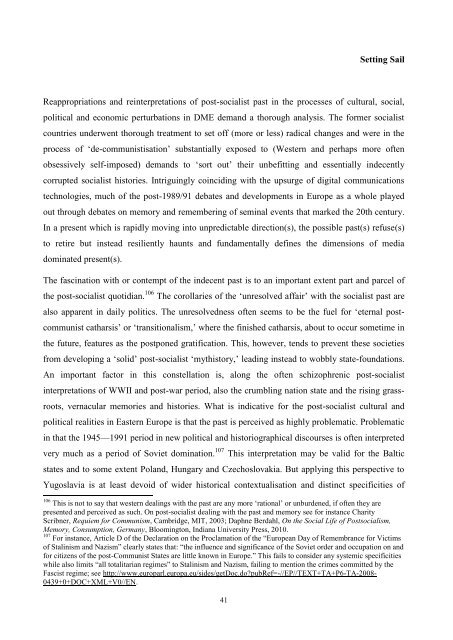UNIVERSITY OF NOVA GORICA GRADUATE SCHOOL ...
UNIVERSITY OF NOVA GORICA GRADUATE SCHOOL ...
UNIVERSITY OF NOVA GORICA GRADUATE SCHOOL ...
Create successful ePaper yourself
Turn your PDF publications into a flip-book with our unique Google optimized e-Paper software.
Setting Sail<br />
Reappropriations and reinterpretations of post-socialist past in the processes of cultural, social,<br />
political and economic perturbations in DME demand a thorough analysis. The former socialist<br />
countries underwent thorough treatment to set off (more or less) radical changes and were in the<br />
process of ‗de-communistisation‘ substantially exposed to (Western and perhaps more often<br />
obsessively self-imposed) demands to ‗sort out‘ their unbefitting and essentially indecently<br />
corrupted socialist histories. Intriguingly coinciding with the upsurge of digital communications<br />
technologies, much of the post-1989/91 debates and developments in Europe as a whole played<br />
out through debates on memory and remembering of seminal events that marked the 20th century.<br />
In a present which is rapidly moving into unpredictable direction(s), the possible past(s) refuse(s)<br />
to retire but instead resiliently haunts and fundamentally defines the dimensions of media<br />
dominated present(s).<br />
The fascination with or contempt of the indecent past is to an important extent part and parcel of<br />
the post-socialist quotidian. 106 The corollaries of the ‗unresolved affair‘ with the socialist past are<br />
also apparent in daily politics. The unresolvedness often seems to be the fuel for ‗eternal postcommunist<br />
catharsis‘ or ‗transitionalism,‘ where the finished catharsis, about to occur sometime in<br />
the future, features as the postponed gratification. This, however, tends to prevent these societies<br />
from developing a ‗solid‘ post-socialist ‗mythistory,‘ leading instead to wobbly state-foundations.<br />
An important factor in this constellation is, along the often schizophrenic post-socialist<br />
interpretations of WWII and post-war period, also the crumbling nation state and the rising grassroots,<br />
vernacular memories and histories. What is indicative for the post-socialist cultural and<br />
political realities in Eastern Europe is that the past is perceived as highly problematic. Problematic<br />
in that the 1945—1991 period in new political and historiographical discourses is often interpreted<br />
very much as a period of Soviet domination. 107 This interpretation may be valid for the Baltic<br />
states and to some extent Poland, Hungary and Czechoslovakia. But applying this perspective to<br />
Yugoslavia is at least devoid of wider historical contextualisation and distinct specificities of<br />
106 This is not to say that western dealings with the past are any more ‗rational‘ or unburdened, if often they are<br />
presented and perceived as such. On post-socialist dealing with the past and memory see for instance Charity<br />
Scribner, Requiem for Communism, Cambridge, MIT, 2003; Daphne Berdahl, On the Social Life of Postsocialism,<br />
Memory, Consumption, Germany, Bloomington, Indiana University Press, 2010.<br />
107 For instance, Article D of the Declaration on the Proclamation of the ―European Day of Remembrance for Victims<br />
of Stalinism and Nazism‖ clearly states that: ―the influence and significance of the Soviet order and occupation on and<br />
for citizens of the post-Communist States are little known in Europe.‖ This fails to consider any systemic specificities<br />
while also limits ―all totalitarian regimes‖ to Stalinism and Nazism, failing to mention the crimes committed by the<br />
Fascist regime; see http://www.europarl.europa.eu/sides/getDoc.do?pubRef=-//EP//TEXT+TA+P6-TA-2008-<br />
0439+0+DOC+XML+V0//EN.<br />
41

















